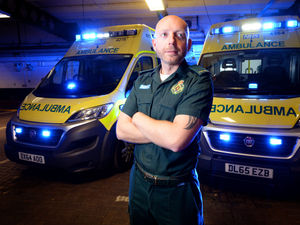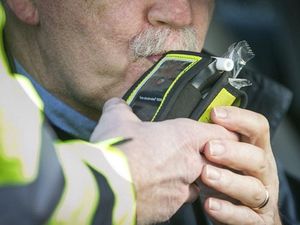How attacks against ambulance staff may soon be tackled with tougher punishments
Paramedic Adam Aston has been assaulted and verbally abused while trying to rescue people in his life-saving role.

He knows colleagues who have had their noses broken and fireworks thrown at them.
"These attacks are cowardly and reprehensible," says Mark Pritchard, MP for The Wrekin, who is co-sponsor of a parliamentary bill calling for stiffer punishments.
West Midlands Ambulance Service staff were assaulted 362 times, and verbally assaulted 525 times, from April 2016 to March 2017 – marking a rise for a third straight year.
It reflects the experience of Dan Stretton, an operations manager based at the ambulance hub in Donnington, Telford.
Mr Stretton, who has been with the service for 17 years, says there has been a noticeable increase in the amount of violence and aggression that’s been shown to staff.
“It’s a very sad part of the job that people have started to accept this as the normal, but it is not acceptable.
“Going back 17 years, it may have been unusual to go to someone’s house and be sworn at, but now it’s on a day-to-day basis.
“It can be anything from someone swearing to someone being punched or kicked, spat at or bitten."
But Mr Stretton believes the figures could be significantly higher as many incidents are not reported.
"The reporting process is all done online," he says. "The difficulty with that is because the crews are so busy they have to get back to a computer at the hub to report it."
Mr Stretton said some incidents had led to paramedics having to take sick days and he believes it has contributed to a fall in staff numbers.

“We have had a high turnover of staff in Shropshire and nationally there’s a lack of paramedics,” he added.
“People have had enough of being shouted at, sworn at, spat at and they go to work in places such as GP surgeries and hospitals where they feel a bit safer and less vulnerable."
He says there is no stereotype of person who is most likely to become aggressive.
“It goes across the board from teenagers to elderly people as well," says the 37-year-old.
"It’s not always the patients, sometimes it can be relatives or bystanders. A lot of the incidents are down to drugs and alcohol but people can also get aggressive because they are frustrated.”
Mr Aston hopes the proposed new laws will put a stop to this and deter people from lashing out at emergency workers.
If passed, the Assault on Emergency Workers Bill, proposed by Welsh MP Chris Bryant MP and co-sponsored by Mr Pritchard, will make attacks on police, fire and ambulance staff an aggravated offence carrying higher sentences.
It will also require people who have spat at emergency staff to undergo immediate blood tests, meaning the victims won't have to wait months to see if they have caught any diseases.
It was unopposed in its second reading in the House of Commons on last week as it works its way up the chain.
"I am glad to be working cross-party to introduce a specific new law to try and help reduce attacks on emergency workers," says Mr Pritchard.

Telford MP Lucy Allan is also backing the bill.
"Our emergency workers in Telford do a brilliant job to keep the public safe," she says.
"That is why I support this Bill to introduce tougher sentences for shameful attacks on emergency workers.
"This is not a party political issue and I am delighted that MPs are working together to protect these key public servants. I will continue to monitor the bill closely to ensure that the bill’s proposals work effectively to protect our emergency workers in Telford and across the country."
Mr Aston, who has worked for West Midlands Ambulance Service for 13 years, says: "I hope with all my heart that this will be successful. It is something that is absolutely really requir
"During those years I have been physically assaulted on two occasions," he says.
"In comparison to some of my colleagues, that is not a bad ratio. Verbal abuse happens quite regularly to all emergency services workers. Physical assaults are on the rise.
"It is demoralising. You join the emergency services to help people, speaking on behalf of firefighter colleagues, the police.
"We all join the public services to help people. It is really demoralising when we face abuse, particularly physical attacks.
"I know colleagues who have had their noses broken in the back of an ambulance.
"I am aware of firefighter colleagues who have had fireworks thrown at them. Bricks thrown at their fire engines. It is quite shocking and it is something which is getting worse and on the rise.
"I believe there are over a 100,000 reported cases from emergency workers during 2015 to 2016. There has been a year on year increase recently."
Mr Aston recalls the last time he was assaulted five years ago.
"It was a chap who had been slashed in his hand," he says. "He started off okay on the journey. But on the route to hospital he became very agitated and started kicking the ambulance window.
"Out of instinct I tried to stop him and saw a boot coming towards my face. I put my hand up and he made contact with my fingers. I thought he broke them but he hadn't and I sustained soft tissue damage."
He feels let down by the Crown Prosecution Service, which failed to proceed with his case.
"I went through the process and gave the interview to the police," he says. "Nine months later I received a letter from the CPS telling me they weren't going to progress the case which is frustrating and demoralising."
He feels prosecutions are rare and sentences far too lenient.
But he hopes the bill, dubbed the "Protect the Protectors Law", and could also cover prison officers, coastguards and other NHS staff, will bring about change.
"I completely welcome the bill," he says. "It would make attacks on emergency services workers an aggravated offence which would hopefully lower the threshold for prosecution and increase sentences."
Mr Aston says West Midlands Ambulance Service has done all it can to help, and now it is down to the law makers.
"We have CCTV inside and outside the ambulances," he says. "We have all been sent on conflict resolution courses.
"The ambulance service have done everything they can and it is now up to the law and lawmakers to support the emergency services workers."
Part of the work put in by the ambulance service is to equip emergency staff to deal with potentially dangerous and violent situations on the front line.
He says: "The conflict course is a mandatory that we do now as part of our mandatory training. It teaches how to try and de-escalate potentially violent situations.
"It is a sad reflection of society that it has come to that. It is something the ambulance service do and all my colleagues welcome that."
But it is not always the patients who attack. Sometimes it can be family, friends or just random members of the public.
"The majority of situations it is usually due to intoxicated patients who have drank too much," says Mr Aston.
"I would say on the majority of occasions it is not actually the patient who has been abusive or assaulted fellow ambulance staff. It is actually people who have been on the scene at the time. Friends or family, or just complete strangers, who have seen fit to intervene while we have been trying to treat patients.
"In my experience it is not necessarily the patient but the people around the patient."
He says the attacks are getting worse, putting the safety of emergency staff at risk. But does he feel this will put off people from enter the job in the future?
"I think it is a sad fact that physical abuse and threats of violence and verbal abuse have become a part of the job of the role of being a member of emergency services staff," he says.
"I wouldn't like to think people are put off from entering the profession because of fear of violence, but we have to acknowledge that violence is there and the potential for physical abuse."
But he believes a lot of people are aware of the issues which is why the bill has gained lots of support.
He adds: "I would like to think that if the law changes, there will be will be a lot of publicity.
"I would like to think the bill would act more as a deterrent to people."




